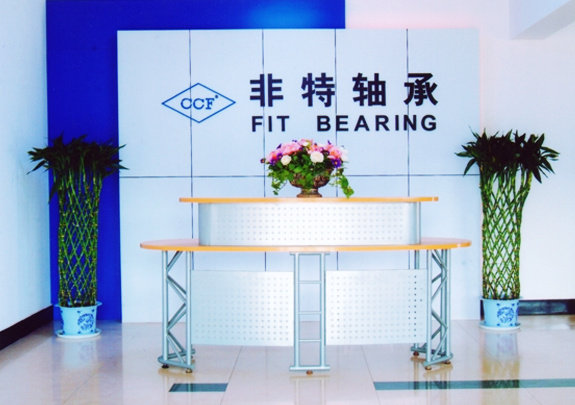Automobile Tensioner Bearings
VIEW DETAILS
VIEW DETAILS
VIEW DETAILS
VIEW DETAILS
VIEW DETAILS

Zhejiang Fit Bearing Co., Ltd. was established in November 2003 with a registered capital of USD 2 million. The plant covers an area of ??35,000 square meters and 20,000 square meters, with more than 120 workers and more than 20 technical management personnel.
At the beginning of its establishment, the company specialized in producing all kinds of low-noise long-life ball bearings. As a professional China Automobile Ball Bearings Manufacturers and Automobile Ball Bearings Suppliers, After years of development in the bearing industry, we have accumulated rich experience in production and management. In 2013, we began to vigorously develop agricultural machinery parts and construction machinery parts. At present, we have formed a team with exquisite technology and excellent management, capable of R&D, manufacturing, sales and service in the bearing industry and agricultural machinery parts. After years of hard work and development, we have formed a capable R&D and manufacturing team. They have rich knowledge and experience in materials, heat treatment, machining and grinding. There are currently 9 professional R&D engineers responsible for the development of new products.
Understand the role of ball bearings in industrial motorsBall bearings are one of the key components in industrial motors. They are mainly used to sup...
Read MoreMain functions of automotive bearingsAutomobile bearings are an indispensable and important component in vehicles. They are responsible for supporting...
Read MoreChecking by noiseA common way to detect whether a motorcycle bearing is damaged is to judge by noise. When a bearing is damaged, it usually makes abno...
Read MoreCheck the industrial motor bearing condition regularlyDuring use, the industrial motor bearing is subjected to long-term load and high-speed rotation,...
Read MoreHow does the choice of bearing material impact the performance and durability of an automobile bearing?
The choice of bearing material plays a crucial role in the performance and durability of an automobile bearing. Here are some impacts of different bearing materials:
1. Steel: Steel bearings are the most common and widely used in automotive applications. They offer excellent strength, durability, and resistance to wear. Steel bearings also have good load-carrying capacity and can withstand high temperatures. They provide stable performance and can handle heavy loads and high speeds. However, they may require lubrication and can be prone to corrosion if not properly protected.
2. Ceramic: Ceramic bearings offer several advantages over steel. They have higher strength, lighter weight, and superior resistance to heat and corrosion. Ceramic bearings also reduce friction, resulting in increased efficiency, reduced energy consumption, and improved performance. They can operate at higher speeds, lower temperatures, and require minimal lubrication. However, they are more expensive than steel bearings and can be more brittle, requiring careful handling.
3. Polymer/Plastic: Polymer or plastic bearings are lightweight, corrosion-resistant, and require less maintenance. They offer good resistance to chemicals, low friction, and improved noise reduction. Plastic bearings also have the advantage of being self-lubricating, reducing the need for additional lubrication. However, they generally have lower load-carrying capacity and may not be suitable for heavy-duty applications.
4. Hybrid: Hybrid bearings combine different materials, such as ceramic balls with a steel raceway, to leverage the benefits of both materials. Hybrid bearings offer increased strength, reduced weight, improved heat resistance, and lower friction compared to steel bearings. They can handle higher speeds and temperatures, reduce energy consumption, and improve overall performance. However, they are more expensive than steel bearings and may still require periodic lubrication.
What are the typical failure modes and causes of failure for automobile bearings?
The typical failure modes and causes of failure for automobile bearings include:
1. Fatigue Failure: This is the most common failure mode for bearings. It occurs due to repeated or cyclic stresses over time, resulting in the formation of cracks and eventual fracture of the bearing. Causes of fatigue failure include overloading, insufficient lubrication, and improper installation.
2. Abrasive Wear: Abrasive particles in the lubricant or contaminants from the environment can cause surface damage to the bearing, leading to wear. This can result in increased friction, decreased efficiency, and eventual bearing failure. Lack of proper filtration, inadequate lubrication, or ingress of dirt and debris are common causes of abrasive wear.
3. Adhesive Wear: Adhesive wear occurs when the surfaces of the bearing and its mating components seize and then experience localized transfer of material. This can lead to surface roughening, loss of dimensional accuracy, and ultimately, bearing failure. Insufficient lubrication, excessive load, and high temperature are common causes.
4. Corrosion: Corrosion can occur due to moisture, chemicals, or other corrosive agents present in the operating environment. It leads to the degradation of the bearing material, resulting in pitting, cracking, or rust formation. Inadequate protection, exposure to harsh environments, and lack of proper maintenance can cause corrosion.
5. Overheating: Excessive heat buildup can damage the bearing material, reduce lubrication efficiency, and cause premature failure. Causes of overheating include overload, improper installation, insufficient lubrication, or high operating speeds.
6. Improper Assembly or Installation: Incorrect installation practices, such as improper alignment, excessive interference fit, or wrong bearing preload, can lead to premature bearing failure. These issues can cause increased stresses, misalignment, and uneven load distribution, leading to accelerated wear and eventual failure.